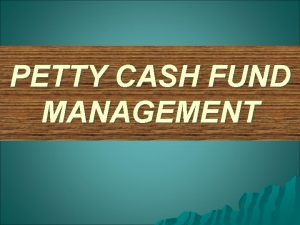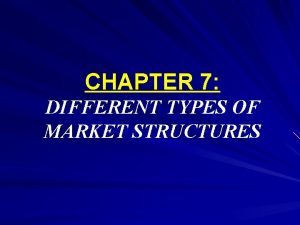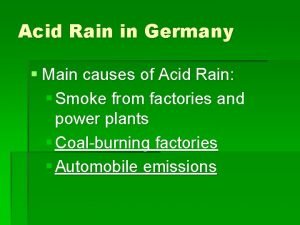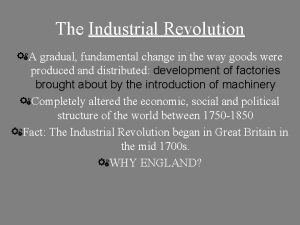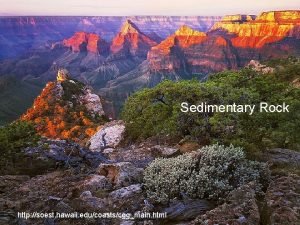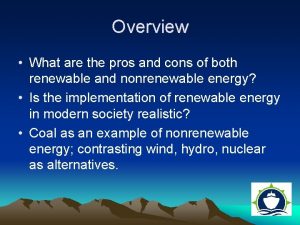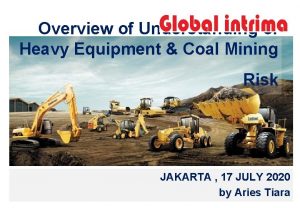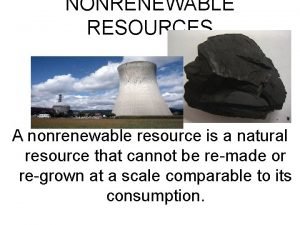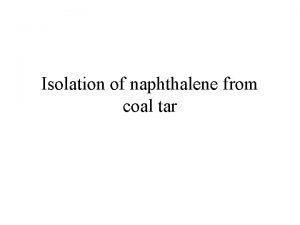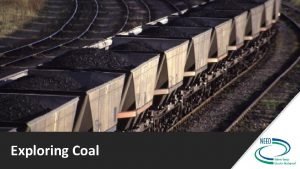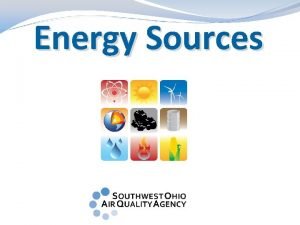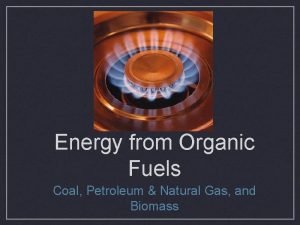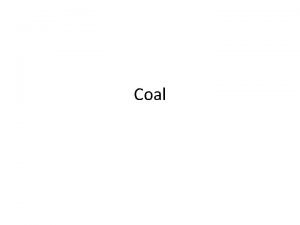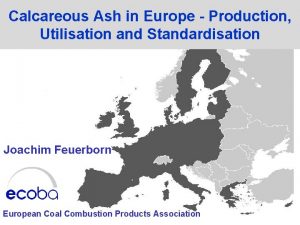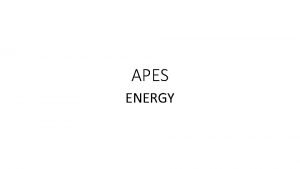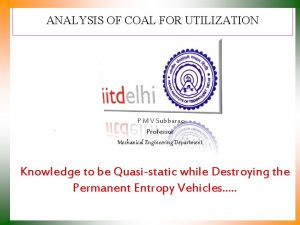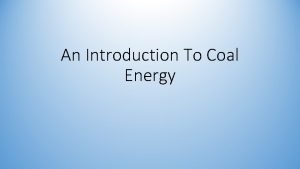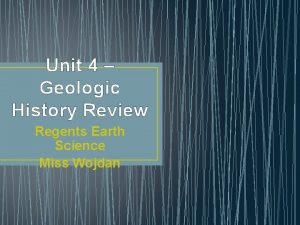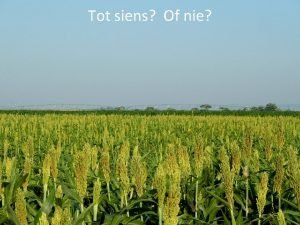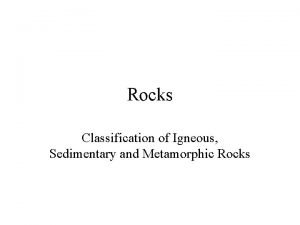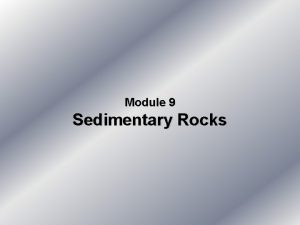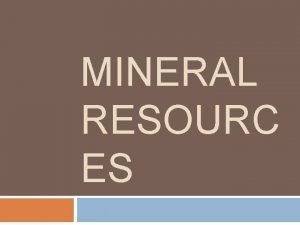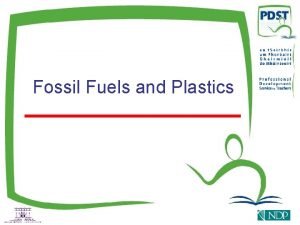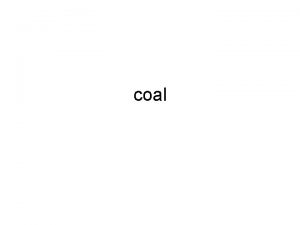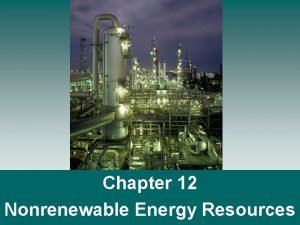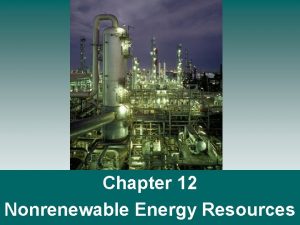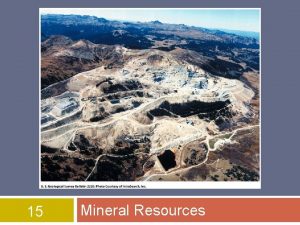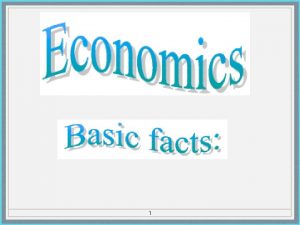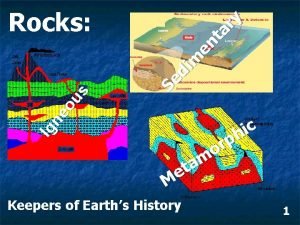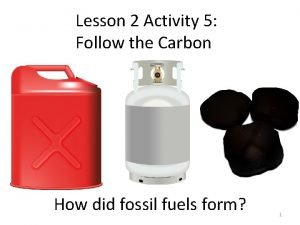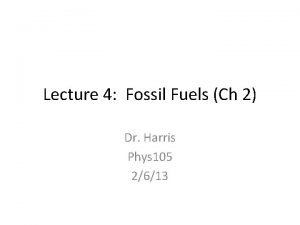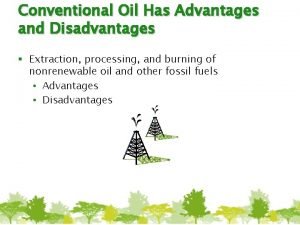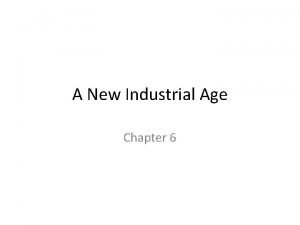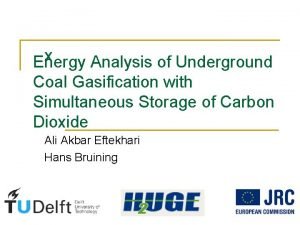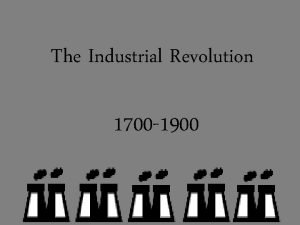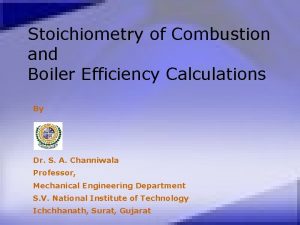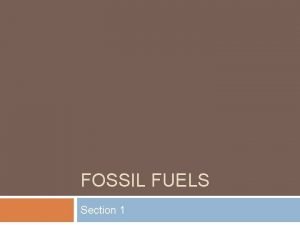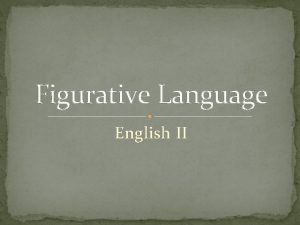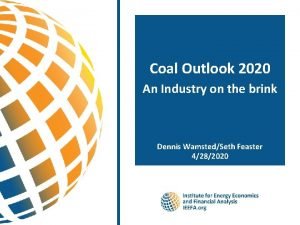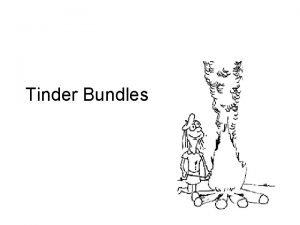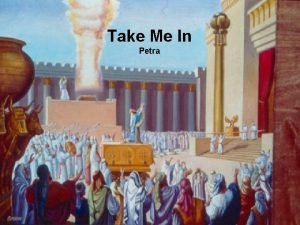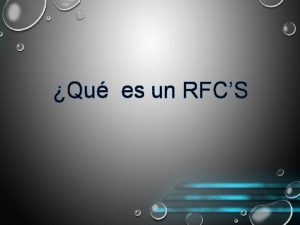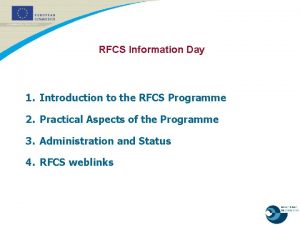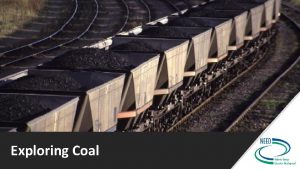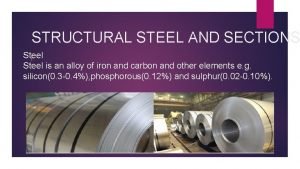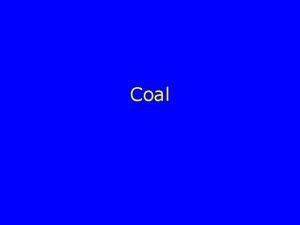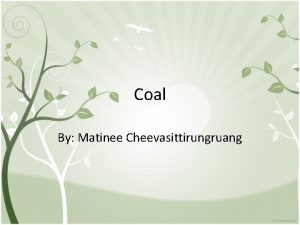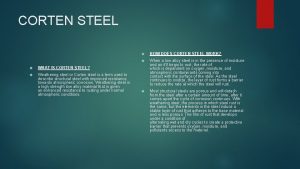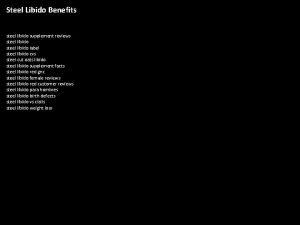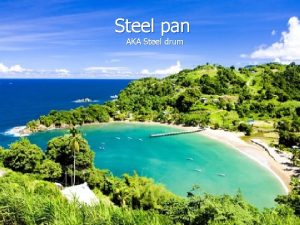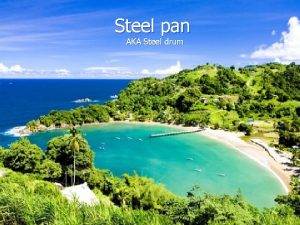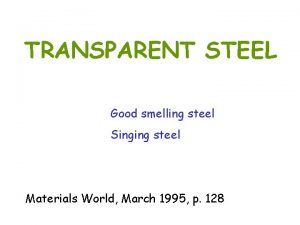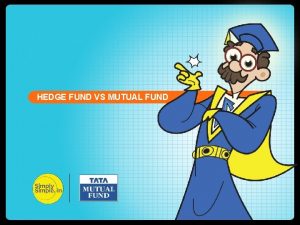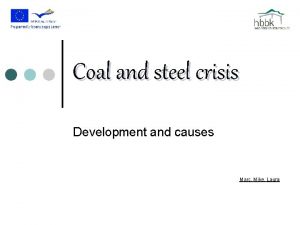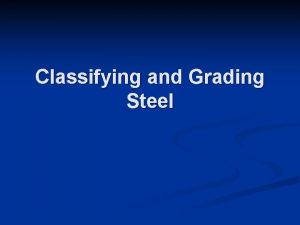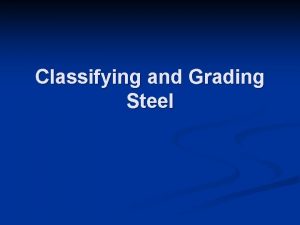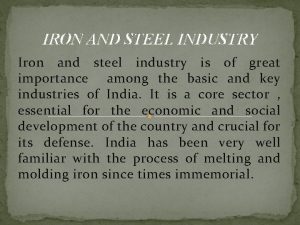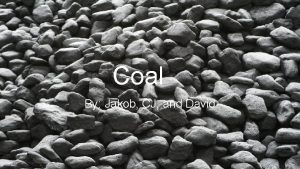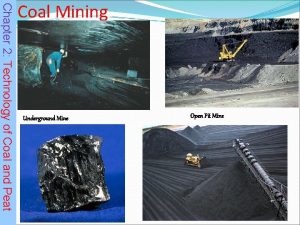The Research Fund for Coal and Steel RFCS












































- Slides: 44

The Research Fund for Coal and Steel (RFCS) "Information how to prepare a proposal – with focus on coal industry" Wolfgang Schneider Research Fund for Coal and Steel DG RTD Directorate G - Industrial Technologies 2 – 3 July 2012, Romania 1

Structure of Presentation Evaluation steps & how to submit a proposal ? - General information - Observations & most common weak points - Examples of successful proposals - From paper to electronic submission How to register as an expert in CORDIS ? - Explanation of procedure - Step by step guide 2

Evaluations • On site evaluation (Brussels) • 1 week for coal • 4 weeks for steel • Around 25 to 30 Experts per week + 1 observer • Requirement for experts selection • • • Expertise & Competences No conflict of interest Ca. 50% renewal Max. 3 consecutive participations Geographical origins Gender balance 3

Eligibilitate şi criterii de selcţie Eligibilitate - Lungime şi format 0 = Respins/incomplet 1 = Slab Selecţie 2 = Acceptabila - Proiecte de C&D � 5 criterii 3 = Bun - Măsuri de acompaniament 4 criterii 4 = Foarte bun 5 = Excelent Notare - Pentru fiecare criteriu de la 0 la 5 - Dacă este prioritate anuală, se primeşte 1 punct bonus BONUS 4

Proiecte de Cercetare, Pilot & Demonstrare 5 criterii, note de la 0 la 5 1. 2. Abordare ştiinţifică şi tehnică Prag : dacă nota < 3, propunerea este respinsă ! Conţinut inovator Prag: dacă nota < 3, propunerea este respinsă ! 3. 4. 5. Compatibilitate resurselor şi calitatea partneriatului Interes industrial, perspective ştiinţifice/tehnice Valoarea adăugată pentru Comunitate, contribuţia la politicile UE + 1 punct dacă propunerea cuprinde cel puţin una dintre priorităţile anuale 5

Măsuri de acompaniament (= Diseminarea cunoştinţelor acumulate, seminarii/conferinţe privind proiectele/priorităţile) 4 criterii, note de la 0 la 5 1. Contribuţia la obiectivele FCCO 2. Perspective ştiinţifice, tehnice şi socio-economice 3. Valoarea adăugată pentru Comunitate, contribuţia la politicile UE 4. Informaţii privind bugetul şi resursele Nu este niciun prag la fiecare criteriu, dar este un prag general de 15/20 ! 6

Evaluation in 3 steps (1) Each proposal is read and evaluated independently by 3 evaluators 7

Evaluation in 3 steps (2) Each proposal is read and evaluated independently by 3 evaluators A meeting is convened by a Commission officer 8

Evaluation in 3 steps (3) Each proposal is read and evaluated independently by 3 evaluators A meeting is convened by a Commission officer with the 3 evaluators Outcome is summarised in a consensus report 9

Successful consensus report • Agreed text reflecting the experts’ common assessment • No horse trading • Share views and reach agreement • Score according to the common text The final score should reflect the agreed text ! 10

Observation: Rejection of applications Eligibility Criteria • Length of proposal • Form B 1 (administrative overview) - maximum 5 pages • Form B 2 (proposal decription) - maximum 10 pages if applicable: • Form B 3 mandatory info for resubmitted propoals (last evaluation report, summary of changes made) - maximum 2 pages • Respect of format • Form B 4 (technical annex) - no additional documents in whatever format 11

Most common weak points Criterion 1 (Scientific & technical approach) • State-of-the-art • Poorly described – position at European & worldwide level • Existing patents not taken into account or referenced • No prioritisation of reference list (Form A 1) • Feasibility • Poor description/lack of vision on development & validation stages • Methods & Techniques, Approach • Experimental activities: link/integration & global objectives unclear • Excessive modelisation & simulation on unvalidated concepts “Threshold” CRITERION 12

Most common weak points Criterion 2 (Innovative content) • Often not so innovative – new ideas necessary • Real innovative aspects remain unclear • Incremental research & added value • Perspective of a wider & general use of expected results: poorly described “Threshold” CRITERION 13

Most common weak points Criterion 3 (Consistency of resources/quality of partnership) • Project Scheduling - Coherence of flow of tasks - Timing: either lax, either ambitious • Partnerships - Industrial partners: often only pointed/specific contributions - Universities: implication in industrial & economic project parts - Plethoric & redundant partnerships - « Sleeping » partners without real contribution - (Real) Participation of industrial partners • Workplan - Deliverables • Who is responsible for what? • Definition - (Clear) Overall WP flow diagram is helpful 14

Most common weak points Criteria 4 & 5 (Industrial interest & Community added value/policies) • Lack of knowledge of market deployment • Evaluation of impact on competitiveness: poor or inexistant • Quantitative assessment of economic impact: poor or inexistant • Metrics of success missing (preferably with quantitative criteria) for Go / No Go • Publication strategy poor (communication, seminars/workshops, website, …) 15

Some remarks & advice • • • Strong competition High quality level of proposals Long process: start early with experienced partners ! Descriptions should be short & concise, but don't expect the evaluators to dig out necessary information Explain improvements in case of resubmission Test your application by ‘neutral’ proof-readers Make use of the RFCS projects synopsis Enrol as an expert (Evaluator) Typical projects: - Focused industrial subjects, almost problem solving - Dedicated and manageable consortium (5/8 partners) - Average funding ~ 1 – 2 M€ 16

How to submit a proposal • Since 2011, RFCS proposals are to be submitted electronically. • To be able to apply to the RFCS, each beneficiary needs a user ID and a Participant Identification Code (PIC). • Unless you have already one (through prior participation in the RFCS or 7 th Framework Programme) request and validate your PIC as soon as possible through the Unique Registration Facility (URF). • Step by step description on RFCS website 17

18

19

20

21

22

23

Expert Registration • • • 1 dedicated platform: CORDIS For both FP and RFCS Simple process Provides detailed information In English REGISTER AS AN EXPERT https: //cordis. europa. eu/emmfp 7/index. cfm 24

- Register - New Expert 25

- Name - Birth date - Email - Password 26

- Account created - Click “Continue” 27

IMPORTANT Select FP 7 Expert AND Non-FP expert 28

Fill in: ü Personal details ü Linguistic skills ü Activities & Keywords ü Educational background ü Experience ü Employment history ü Interests ü Publications 29

CĂRBUNE: Obiectivele programului de cercetare Managementul dependenţei externe de aprovizionarea cu energie Îmbunătăţirea competitivităţii cărbunelui la nivel comunitar Sănătate şi siguranţă în mine Pictures © Shutterstock, 2010 Protecţia eficientă a mediului & îmbunătăţirea utilizării cărbunelui ca sursă “curată de energie” Pictures © Shutterstock, 2010 Cărbunele înseamnă: Huilă - Lignit - Cocs - Brichete – Şisturi 30

Overview about selected RFCS projects List of selected projects relevant for coal mining: • • • DRYCOAL COMTES 700 IMPREX MINFIREX CARBOLAB OXYBURNER ENCIO EDAFFIC UCG & CO 2 STORAGE NEMAEQ 31

DRYCOAL Commercial-Scale Testing of a Fluidized-Bed Drying Plant for Highly Efficient Lignite-Fired Power Plants 2004 – 2009 6 Beneficiaries • Budget 6, 2 M€, Funding 2, 5 M€ • Addresses climate protection (CO 2 reduction) and efficiency increase through pre-drying of lignite. The improvement of efficiency is an important element in the concepts related to CO 2 capture technologies in order to improve plant performance. Beside the efficiency improvement achieved with the combustion of dry lignite the dry lignite can be used as start-up fuel (replacing costly start-up fuels like oil). Application of this technology possible for new plants as well as for retrofitting of existing plants. 32

OXYBURNER Design and test of an advanced economic, efficient, and clean large-scale low NOx oxy-fuel burner concept for lignite and sub-bituminous coals 2006 – 209 5 Beneficiaries • Budget 1, 4 M€, Funding 0, 9 M€ • Oxy-fuel combustion is a promising technology for clean coal technology and CO 2 capture and can be adapted to both new and existing pulverised coal-fired power stations. This project focussed on burner design and developed an advanced low NOx oxy-fuel burner concept for lignite and sub-bituminous coals. 33

COMTES 700 Component test facility for a 700° C power plant 2004 – 2011 6 Beneficiaries • Budget 15, 2 M€, Funding 6, 1 M€ • Flagship project: The objective is to design, manufacture, erect and operate a Component Test Facility (CTF) to test high temperature resistant new materials needed to realise a 700 C° and 350 bars coal based power plant with efficiencies above 50%. COMTES 700 is considered as the last step before the actual demonstration of the 700 C° technology for pulverised coal power plants at industrial scale 34

ENCIO European network for component integration and optimisation 2011 – 2017 5 Beneficiaries • Budget 24 M€, Funding 10 M€ • Flagship project: Transition from pilot to demo plant for 700°C technology, last step before construction of a 700°C power plant. Key goal: concentrate all scientific and technological efforts to make 700°C technology ready for deployment in coal fired power plants. The project will focus on practical investigations regarding manufacturing, welding, repair and life-time concepts for thick walled components. ENCIO can be seen as perfect 35 transition from pilot towards demo features.

IMPREX Improved extraction ratios for deep coal mines 2008 – 2011 7 Beneficiaries • Budget 2, 4 M€, Funding 1, 4 M€ • Improve coal recovery ratios in European deep mines significantly in a safe and efficient manner; more sustainable use of European coal reserves and reduce reliance upon imported energy; improving means allowing to extract significant tonnages in the extensive areas of coal which are left around/between longwall panels and improving the ability to maximise the extraction of thick coal seams where large tonnages of coal are currently abandoned in the goaf 36

EDAFFIC Early detection and fighting of fires in belt conveyors • 2008 – 2011 • 7 Beneficiaries • Budget 2, 2 M€, Funding 1, 3 M€ • Incidents and accidents involving conveyor belt fires cause major infrastructure damage and production losses to mining companies all around the world; research will deal with the specific topics of fire in conveyor belts and related ventilation issues; a multidisciplinary and comprehensive approach including prevention, early detection, combustion process, new belt materials, fire fighting, ventilation use in fire fighting or managing smoke, inertization, environmental hazards and occupational safety 37

MINFIREX Minimising risk for and reducing impact of fire and explosion hazards in underground coal mining 2010 – 2013 • Budget 2, 6 M€, Funding 1, 5 M€ • 7 Beneficiaries • Fires and explosions are still major cause of injuries and fatalities in underground coal mining. But also operation downtimes and productions losses are caused by fires. The project aims at developing strategies to prevent fires and explosions and developing innovative detection measures and fire fighting methods especially for hidden fires; including an innovative extinguishing system ensuring effective protection against propagation of fires 38 or explosions.

UCG & CO 2 STORAGE Study of deep underground coal gasification and the permanent storage of CO 2 in the affected areas 2010 to 2012 • 7 Beneficiaries • Budget 3, 1 M€, Funding 1, 8 M€ • Evaluate the potential of deep lying coal seams for the development of UCG and to show that the UCG in deep coal mines can reuse the same boreholes (with technical modifications) for the injection and permanent storage of CO 2. Initial estimates suggest that at 1600 m, all the CO 2 produced during gasification could be re-injected and stored in liquid form. State-of-the-art geo-mechanic, hydro geological and UCG cavity growth models will be developed and validated for application to possible future demonstration sites. 39

CARBOLAB Improving the knowledge of carbon storage and coal bed methane production by "in situ" underground tests • 2009 to 2013 • 5 Beneficiaries • Budget 4, 1 M€, Funding 2, 5 M€ • Improve knowledge of physical and chemical processes involved in the Enhanced Coal Bed Methane (ECBM) technique, by means of a series of “in situ” tests of CO 2 injection and CBM production in an underground coal mine; High-quality data shall be obtained for: • − Development of improved models simulating the mechanical, physical/chemical behaviour of coal & gases • − Identification and sizing of the physical parameters during and after the injection experiments • − Long term risk assessment of the CO 2 storage. 40

NEMAEQ New mechanisation and automation of longwall and drivage equipment • 2006 to 2009 • 8 Beneficiaries • Budget 3, 8 M€, Funding 2, 3 M€ • Success story: Complete automation, including optimised mechanisation of longwall workings and roadway drivages, are key factors for improving mine productivity. This successful project developed a fully automated coal shearer together with the related side equipment. The research resulted in considerably improved productivity of ca. 50% within European Coal mines. 41

Concluzii Cercetarea importante Comunităţii cărbune şi prietenoase şi dezvoltarea tehnică sunt mijloace foarte pentru suportul obiectivelor energetice ale din punctul de vedere al aprovizionării cu a transformării şi utilizării competitive şi cu mediul. Deşi bugetul FCCO este mai mic decât al altor programe, acesta este un instrument de succes pentru îmbunătăţirea cunoştinţelor şi pentru dezvoltarea unor tehnologii aplicabile în domeniul cărbunelui. FCCO este disponibil în fiecare an pentru proiecte de cercetare, pilot şi demonstrare care susţin proiectele legate de domeniul cărbunelui. 42

Site-uri utile pentru FCCO Website-ul FCCO - http: //cordis. europa. eu/coal-steel-rtd/ Pachetul informativ - http: //cordis. europa. eu/coal-steel-rtd/infopack_en. html Ultimele rapoarte tehnice publicate: - http: //bookshop. europa. eu/ - http: //cordis. europa. eu/library/ Rezumatele proiectelor FCCO în curs - http: //cordis. europa. eu/coal-steel-rtd/synopsis_en. html 43

Thank you for your attention 44 !
 Achronims
Achronims Petty cash journal
Petty cash journal Fekkai shampoo
Fekkai shampoo Acid rain in germany
Acid rain in germany An abundance of coal an irregular coastline
An abundance of coal an irregular coastline Sedimentary rocks in hawaii
Sedimentary rocks in hawaii Cons of coal
Cons of coal Coal mining process
Coal mining process Wildlife conservation act
Wildlife conservation act Naphthalene from coal tar
Naphthalene from coal tar Peat bituminous anthracite lignite
Peat bituminous anthracite lignite Pros about coal
Pros about coal Stages of coal formation
Stages of coal formation What the most abundant fossil fuel
What the most abundant fossil fuel Children working in coal mines
Children working in coal mines Ashmasters chimney service inc
Ashmasters chimney service inc Cons of coal
Cons of coal Alex coal pmv
Alex coal pmv What do we use coal for
What do we use coal for A whale bone that originally contained 200 grams
A whale bone that originally contained 200 grams Coal tot
Coal tot Is coal a sedimentary rock
Is coal a sedimentary rock What kind of sedimentary rock is coal
What kind of sedimentary rock is coal Coal strip mining
Coal strip mining Coal oil
Coal oil Coal advantages
Coal advantages Coal advantages
Coal advantages Coal advantages
Coal advantages Coal strip mining
Coal strip mining Coal candy with hammer
Coal candy with hammer Anthracite coal foliated or nonfoliated
Anthracite coal foliated or nonfoliated Coal formation
Coal formation Coal formation
Coal formation Coal formation
Coal formation Who organized coal miners their wives
Who organized coal miners their wives Underground coal gasification
Underground coal gasification Coal spreadbetting
Coal spreadbetting Boiler combustion efficiency calculation
Boiler combustion efficiency calculation Coal beds
Coal beds Coal is a solid fossil fuel formed from plant remains
Coal is a solid fossil fuel formed from plant remains Black as coal figurative language
Black as coal figurative language Will using coal power in just
Will using coal power in just Tinder bundle
Tinder bundle Take me to the past
Take me to the past Organic sedimentary rocks
Organic sedimentary rocks

